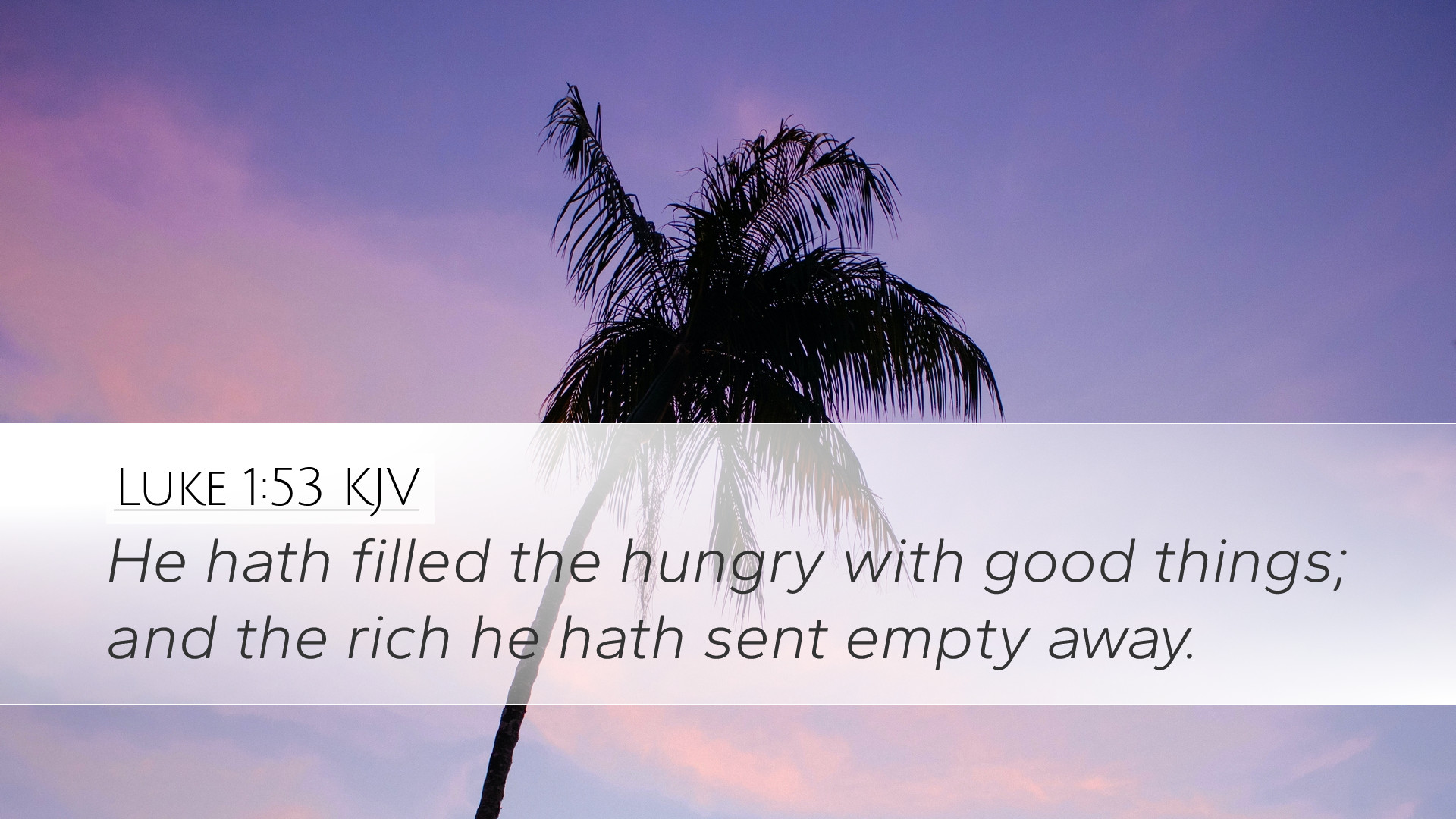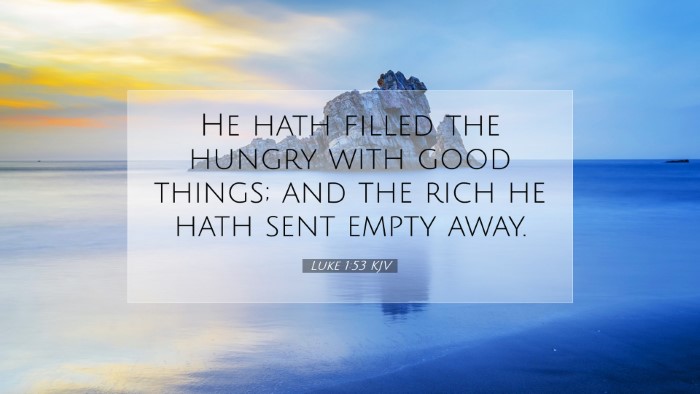Commentary on Luke 1:53
Luke 1:53 states: "He has filled the hungry with good things, and the rich He has sent away empty." This verse is part of the Magnificat, the song of Mary. It reflects profound theological themes and illustrates the reversal of social norms that is characteristic of God's kingdom.
Contextual Background
The setting of this verse occurs during Mary's visit to Elizabeth, where she praises God for His mighty acts of salvation and mercy. This song encapsulates the essence of God's dealings with humanity, particularly emphasizing His care for the humble and needy, contrasting them with the proud and affluent.
Exegesis and Theological Insights
In this verse, we observe two contrasting groups: the hungry and the rich. This duality serves as a literary device to underline God's role as a divine equalizer, reflecting a central theme in the Gospel of Luke.
-
The Hungry:
Henry remarks that "the hungry" can be understood both physically and spiritually. This includes those who yearn not only for food but also for righteousness, echoing the Beatitudes where Jesus declares, "Blessed are those who hunger and thirst for righteousness, for they shall be filled” (Matthew 5:6). This shows God's inclination towards those in need, demonstrating His generosity and grace.
-
The Rich:
Barnes emphasizes that "the rich" often represent the complacent and self-reliant who are not dependent on God. Their wealth can manifest as a barrier to receiving spiritual blessings, and hence, they are sent away empty. This mirrors Jesus' teaching about the difficulty for a rich man to enter the kingdom of God (Luke 18:25).
Mary's Perspective
From Mary's perspective, this assertion is not merely a physical observation but is laden with prophetic significance. Clarke notes that Mary's song illustrates her deep understanding of God's covenantal faithfulness. The fulfillment of God’s promises to Israel is encapsulated in her expression of joy, where she recognizes her humble status and the exalted nature of God’s grace.
Theological Implications
This verse reflects several critical theological implications regarding God's kingdom:
-
The Nature of God's Favor:
God’s favor often rests upon those of lowly stature, defying societal stratifications. Mary’s declaration serves to remind us that divine grace is not contingent upon human wealth or status.
-
Reversal of Fortunes:
The theme of reversal is significant in Scripture. This reflects the prophetic announcement in Isaiah and is often reiterated by Jesus throughout His ministry. The message that the first shall be last and the last first (Matthew 19:30) finds its roots in this divine economy.
-
God's Justice:
This verse affirms God's justice, as He fills the hungry and sends the rich away empty. This directly challenges both materialistic and self-sufficient attitudes prevalent in society, calling for humility and reliance on God.
Application to Today's Believers
The application of Luke 1:53 invites believers to reflect on their spiritual condition:
-
Recognizing Our Need:
Just as the hungry need sustenance, believers must acknowledge their spiritual poverty without Christ. This verse challenges the affluent to consider their spiritual health and reliance on God rather than temporal wealth.
-
Embracing Humility:
In a world that often glorifies the rich and powerful, this message serves as an exhortation to embrace humility, recognizing that God’s grace is accessible to all, particularly those who come with contrite hearts.
-
Active Compassion:
The call is for active engagement with the needy. Just as God fills the hungry, believers are urged to be instruments of His grace by caring for the marginalized and addressing social inequalities.
Conclusion
Luke 1:53 presents a rich tapestry of divine truth encapsulated within a simple yet profound statement. As pastors, students, theologians, and scholars reflect on this verse, they are challenged to consider the heart of God towards humanity—particularly the poor in spirit and the needy. May this verse inspire a deeper understanding of God's kingdom and motivate believers to live out His justice and mercy in their communities.


